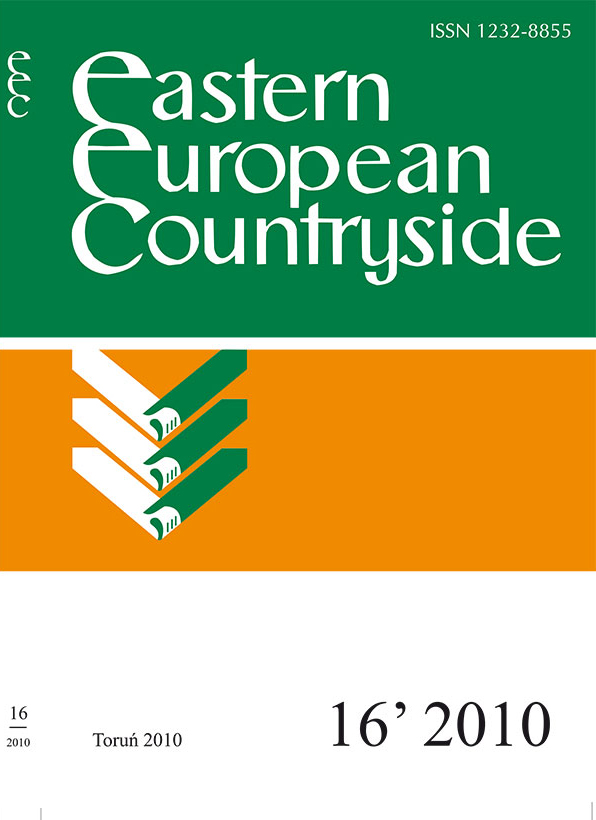Poverty and Social Exclusion in the Rural Areas of Hungary
DOI:
https://doi.org/10.2478/v10130-010-0008-2Keywords
social exclusion, rural poverty, collective factors, ethnicity, spatiality, peripherisation, cohesion policy, cooperation, monitoringAbstract
The study analyses the role of - two so-called collective factors - spatiality and ethnicity in social exclusion in Hungary. Furthermore, it highlights the unfavourable effects of incorrect political decisions concerning regional development on rural poverty and exclusion in Hungary's history since the end of World War II. It suggests the need for a new practice of monitoring and focused reporting at micro-regional level, close cooperation of regional development and social policy actors in regional planning, as well as a definite commitment of local decision makers in order to reduce spatial inequalities and avoid further escalation of exclusionReferences
Balcsók, I. 2006 A munkanélküliség területi egyenlötlenségei és legjellemzöbb folyamatainak alakulása az 1992-2002 közötti idöszakban [Spatial Inequalities of and Major Trends in Unemployment between 1992 and 2002]. A PhD thesis. Debrecen: Debrecen University, p. 158.
Dövényi, Z. 2003 A településrendszer fejlödése és sajátosságai [Development and Characteristics of the Settlement System] In Perczel, G. (Ed.) Hungary's Socioeconomic Geography. Budapest: ELTE Eötvös Publishers, pp. 521-528.
Faluvégi, A. 2004 Térbeli kirekesztödés, a térségek leszakadása [Spatial Exclusion and Divergence of Regions] In Monostori, J. (Ed.), Poverty and the Process of Social Exclusion. Budapest: CSO, pp. 197-223.
Ferge, Zs. 2002 Struktúra és egyenlötlenségek a régi államszocializmusban és az újkapitalizmusban [Structure and Inequalities in Old State Socialist and New Capitalism] Szociológiai Szemle. No 4: 9-33.
Jász, K. And Szoboszlai, Zs. 2005 Socially Excluded Groups in Hungary and a Special Re-integration Programme. In Hungarian Spaces and Places. Patterns of Transition. Pécs: Centre for Regional Studies, pp. 274-289.
Jász, K. 2006 A társadalmi kirekesztödés térbeli sajátosságai az Észak-Alföldi Régióban [Spatial Characteristics of Social Exclusion in the Northern Great Plain Region] A PhD thesis, PTE, Földtudományok Doktori Iskola, p. 175.
Ladányi, J. and Szelényi, I. 2002 Cigányok és, szegények Magyarországon, Romániában és Bulgáriában [The Roma and the Poor in Hungary, Romania and Bulgaria] Szociológiai Szemle. No 4: 72-95.
Ladányi, J. and Szelényi, I. 2004 A kirekesztettség változó formái [Changing Forms of Exclusion] Budapest: Napvilág Publishers, p. 201.
Littlewood, P. 1999 Social Exclusion in Europe. Problems and paradigms. London: Ashgate.
Nemes Nagy, J. 2003 Regionális folyamatok [Regional Processes] In: Perczel, G. (Ed.), Hungary's Socio-economic Geography. Budapest: ELTE Eötvös Publishers, pp. 565-569.
Szalai, J. 2002 A társadalmi kirekesztödés egyes kérdései az ezredforduló Magyarországán.
[Some Issues of Social Exclusion in Hungary at the Turn of the Millennium] Szociológiai Szemle. No 4: 34-51.
A hét magyarországi régió szociális helyzetfeltárásának rövidített változata [A Summary of the Social Situation Assessment of Hungary's Seven Regions] 2004. National Institute for Families and Social Policy, Manuscript.
A regionális szintű szociális tervezési kapacitások megerösítése, állapotfelmérés, módszertani ajánlás [Increasing Regional-level Social Planning Capacities. A Situation Assessment and Recommended Methodology] 2004 Szolnok: HAS CRR GPRI Szolnok Group of Sociologists.
Combating Poverty and Social Exclusion in Rural Areas: http://ec.europa.eu/social/main.jsp?catId=88&langId=en&eventsId=158
Downloads
Published
How to Cite
Issue
Section
Stats
Number of views and downloads: 428
Number of citations: 2



